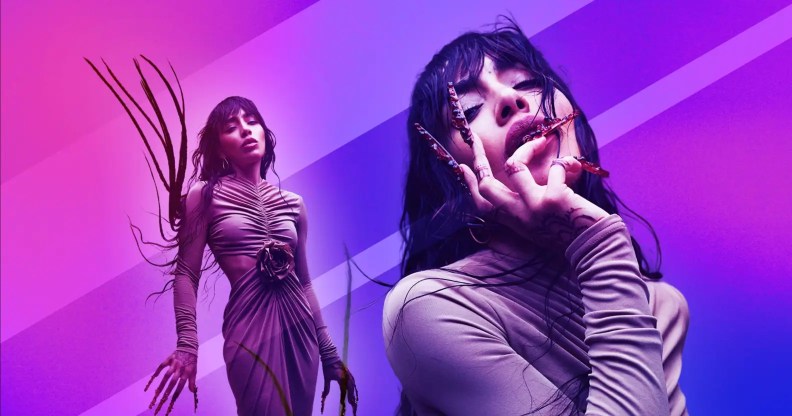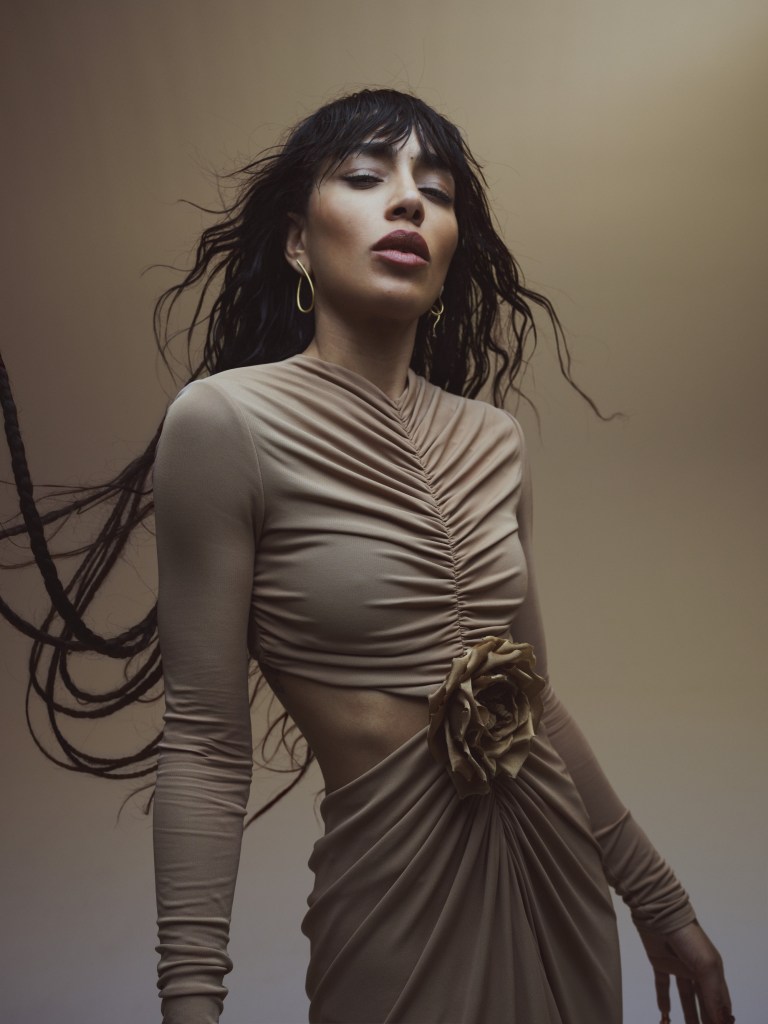Eurovision icon Loreen on her big return, love for her LGBTQ+ family and why she adores drag queens

Loreen is returning to Eurovision 2023 with hopes of securing the crown a second time. (Supplied/PinkNews)
Queen of Eurovision Loreen talks her new single “Tattoo”, her love of drag, and her big return to the Eurovision stage.
“I’ve never, ever, in my entire career, been to a gay club where I’ve felt negative energy,” Loreen tells PinkNews, emphatically.
The queen of Eurovision is talking about the simply feral reception she received from gay fans after winning Europe’s campest song contest back in 2012. Her victory song, the aptly titled “Euphoria”, has become a staple in every Pride playlist for the past decade.
This year, the Swedish popstar, 39, will return to the competition in a bid to claim the top spot once again with new single “Tattoo”. Much like “Euphoria”, “Tattoo” is electrifying, anthemic and a very possible winner.
According to the bookies, her chances are good. If she wins, she will become only the second contestant to win Eurovision twice, and the first ever woman to do so.
Considering the history-making potential here and the expectations around living up to the high of her first win, you’d think she’d be feeling the pressure. For Loreen though, pressure equals negative energy and that, she makes clear, is something she has no time for.
“My purpose is to create something that gives you a sense of hope, strength, and self empowerment,” she exclusively tells PinkNews via Zoom, explaining that while the competition is important, she’s more interested in connecting with her fans.
It seems she’s already achieved her goal – “Tattoo” has become a hit online and in Sweden, it has spent four weeks at number one in the charts.
“It’s people expressing love, and I’m welcoming it,” she says of the song’s reaction. “I’m so happy. It’s such a healing power, being accepted and appreciated and loved.”
Loreen has been particularly accepted, appreciated and loved by the LGBTQ+ community. She’s headlined Pride events, seen her songs performed by countless drag queens, and has even made the prestigious list of iconic women affectionately dubbed “mother” by the community.
She knew “instantly” that she’d made an impression on LGBTQ+ viewers following her final performance at Eurovision 2012, and while her gay fans see her as a gift, she says they have given her far more in return.
“Before ‘Euphoria’, I was trying to find my space. Where do I belong? Like, where can I be me?” she explains. “I was searching, and wherever I went, there was ‘no’. All of a sudden, I came knocking on this door to the LGBT community, and they’re like: ‘You know what? Come on in.'”
Loreen came out as bisexual during an appearance on Swedish TV in 2017, sharing that, in her eyes, “love is where you find it”. She sees sexuality as fluid, and an emblem of freedom. The LGBTQ+ community champions that.
“That’s the thing with this community, which I would like to call my community,” she says. “We’re accepting of people. We know what it’s like struggling trying to find yourself. That’s the beauty of struggling sometimes; we feel empathy, we understand.
“Without this community, I would not be sitting here. Whenever I’m in my community, I would say I feel very much at peace.”
Earlier this year, she accumulated even more “mother” points after appearing on Drag Race Sverige, the new Swedish version of RuPaul’s Drag Race. Her time on the show, much like everything in Loreen’s universe, was a beacon of positivity. She loved it.
“I had this beautiful energy of all these drag queens around me, and I felt like home,” she says, in awe. “It’s a space where I feel very safe and very loved.
“I didn’t want it to end, to be honest. Like, can we just do another episode? I’m up for it if you’re up for it!”
What is it about drag that inspires her? “It’s so beautiful. They’re being so creative. There’s happiness and pain and promise. I love this. I want to be in this space even more,” she says, impassioned and hinting at a potential future drag queen collaboration. “Can you imagine what we could create?”
As a fervent campaigner – she has been vocal in support of Ukraine following Russia’s invasion of the country and, during 2012’s Eurovision contest, spoke out against host country Azerbaijan and its violation of civil liberties – she doesn’t have much good to say about those across the world who are attempting to demonise and outlaw the drag community.
“How can you want to stand in the way of this?” she questions. “It won’t work. You can never control a spirit. Don’t waste your time trying to change something that will not change.
“Back off, live your life. Let people be what they want to be. Can’t you see that this is all love?”
That someone would want to erase something as joyful as drag is beyond Loreen. Then again, she seems to see the joy and beauty in everything. After speaking to her, it becomes clear that she only does things she wants to do, when she wants to do them.

When her team proposed the idea of a Eurovision return, she turned them down – for four weeks. Then, when she decided the time was right, she changed her mind. It was a characteristically uninhibited move, and one she’s thrilled to have made.
“I can’t even express in words how happy I am to be able to do this together with you guys,” she beams. “There are no words for it. It’s all about connection. I’m longing to stand there and we can connect together, like collective healing.”
She’s imagining her fans and their friends and families, gathering together and popping open a bottle of wine to watch her in the final. She’s practically effervescent as she talks about it. Then, right on cue, she’s back talking about her lifelong ambition to avoid negative energy, whether that’s by headlining gay clubs or heading to Eurovision.
“It connects us closer to each other, because we’re connecting around creativity,” she says of the upcoming contest. “It’s basically the antidote to negative energy. Hey!”
The Eurovision final takes place on Saturday 13 May. “Tattoo” is out now.
How did this story make you feel?

